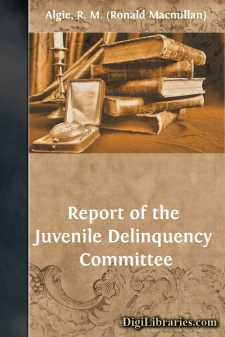Categories
- Antiques & Collectibles 13
- Architecture 36
- Art 48
- Bibles 22
- Biography & Autobiography 813
- Body, Mind & Spirit 142
- Business & Economics 28
- Children's Books 15
- Children's Fiction 12
- Computers 4
- Cooking 94
- Crafts & Hobbies 4
- Drama 346
- Education 46
- Family & Relationships 57
- Fiction 11828
- Games 19
- Gardening 17
- Health & Fitness 34
- History 1377
- House & Home 1
- Humor 147
- Juvenile Fiction 1873
- Juvenile Nonfiction 202
- Language Arts & Disciplines 88
- Law 16
- Literary Collections 686
- Literary Criticism 179
- Mathematics 13
- Medical 41
- Music 40
- Nature 179
- Non-Classifiable 1768
- Performing Arts 7
- Periodicals 1453
- Philosophy 64
- Photography 2
- Poetry 896
- Political Science 203
- Psychology 42
- Reference 154
- Religion 513
- Science 126
- Self-Help 84
- Social Science 81
- Sports & Recreation 34
- Study Aids 3
- Technology & Engineering 59
- Transportation 23
- Travel 463
- True Crime 29
Report of the Juvenile Delinquency Committee
Categories:
Description:
Excerpt
ORDERS OF REFERENCE
Extracts from the Journals of the House of Representatives
Tuesday, the 28th Day of September 1954
Ordered, "That a Select Committee be appointed, consisting of ten Members, to consider the Report of the Special Committee on Moral Delinquency in Children and Adolescents (H-47, 1954); the Committee to make such recommendations or observations as it thinks fit to the House or the Government; the Committee to have power to sit during the recess and for twenty-eight days after the commencement of the next ensuing session; the Committee to consist of six Members to be nominated by the Prime Minister and four Members to be nominated by the Leader of the Opposition, such names to be submitted to the Clerk of the House on or before 31 December 1954. (Right Hon. Mr Holland.)"
The names submitted in accordance with the above Order of Reference were: Mr Aderman, the Hon. Mr Algie, Mr Barnes, the Hon. Mr Hanan, Mrs McMillan, the Hon. Mr Mason, Mr D. M. Rae, the Hon. Mrs Ross, Mr Skoglund, and the Hon. Mr Tirikatene.
Wednesday, the 20th Day of April 1955
Ordered, "That the period set down by Order of the House dated 28 September 1954 within which the Juvenile Delinquency Committee was required to present its report be extended to 1 September 1955." (Hon. Mr Algie.)
Wednesday, the 31st Day of August 1955
Ordered, "That the period set down by Order of the House dated 20 April 1955 within which the Juvenile Delinquency Committee was required to present its report be extended to 1 October 1955." (Hon. Mr Algie.)
The Committee met on two days during the recess and on a number of occasions during the 1955 session.
For many reasons which need not be set out in this report, but which were communicated to Parliament, it was found impossible to present a report within the limits of time allowed, and by resolution of the House it was finally agreed that the report should be presented on or before the 1st day of October 1955.
We have given careful attention to each and every one of the recommendations of the Mazengarb Committee. We have not felt it to be our duty to hear over again all or any of the evidence placed before that Committee, nor have we regarded it as our duty to deal —— broadly with the incidence and causes of moral delinquency, or with the discovery and presentation of remedies for this social malady. On the contrary, we felt that we were required:
(1) To study the legislation relating to this subject and enacted by Parliament in 1954, to consider its efficacy, and, if possible, to make recommendations for its improvement, and
(2) To consider the suggestions made by the Mazengarb Committee for action by particular Government Departments, to give an opinion as to how far such recommendations could be given practical effect, and to set out for the information of Parliament the extent to which those recommendations had been put into operation.
Our views, suggestions, and recommendations are as follows:
The Need for Continuous Expert Investigation
In the course of our study of this problem it was frequently pointed out to us that there was a real need for a thorough and continuous study of this problem by those who from their training, experience, and occupation were best qualified to advise as to the scope and extent of the problem, as to its general causes, and as to the practical ways of dealing with it....


